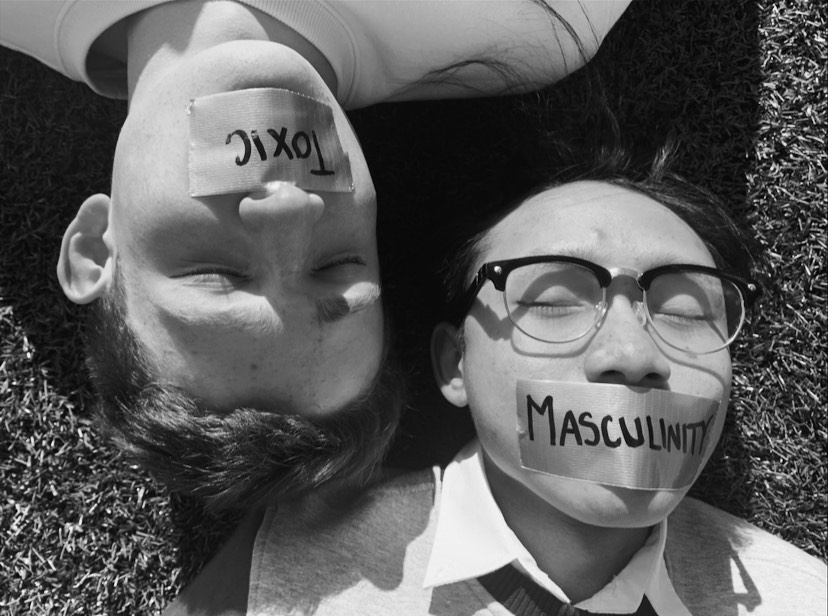Today’s men continue to fall victim to toxic masculinity, and they must be set free from these societal constructs
Photo pictures Logan Deison (left) and Kenny Deng (right) displaying how toxic masculinity prevents them from being their true selves.
How would you react if you saw a boy playing with barbie dolls? How often have you heard a man’s sexuality questioned because he was interested in something more “feminine?” Men face toxic masculinity more often than they may realize in their day to day lives because of Western societal culture. Society expects men to assert a form of “strength” and “dominance” only because of their gender.
Toxic masculinity is defined in a study by the Journal of School of Psychology as, “The constellation of socially regressive [masculine] traits that serve to foster domination, the devaluation of women, homophobia, and wanton violence.”
In a poll done out of 47 high school boys in Colorado, 48% said they have fallen victim to toxic masculinity in society. This percentage shows a closer, at home look at how toxic masculinity is still present in society, and the younger generation of men.
Senior Taylor Kendall from Ralston Valley High School states, “I’ve been called gay for recognizing that a dude is good looking.”
Conversely, when a woman compliments another woman on her looks, she is not seen as gay because it is more accepted in Western culture. When a man does this to his own gender, he faces toxic masculinity from those around him because this is perceived as being gay, which is frowned upon in society’s interpretation of toxic masculinity.
 These toxic expectations of what a “man” should be are destroying the true expressions of men’s personal masculinity. Men have the right to choose what masculinity looks like for them, meaning that this is their own personal expression. A man can believe that wearing dresses is masculine or accessorizing in jewelry is masculine. The definition of masculine is up to each man to decide, not society.
These toxic expectations of what a “man” should be are destroying the true expressions of men’s personal masculinity. Men have the right to choose what masculinity looks like for them, meaning that this is their own personal expression. A man can believe that wearing dresses is masculine or accessorizing in jewelry is masculine. The definition of masculine is up to each man to decide, not society.
The entire concept of toxic masculinity proves to be hypocritical because it is common for men to feel that they must suppress their emotions but then transfer those emotions to anger. For example, a man who subscribes to toxic masculinity may criticize a female for being too emotional, but then praise acting on anger and dominance. This is just as much an emotional response. This proves that the constructs of toxic masculinity are illogical and inevitably harmful to men’s mental state.
“Society has conditioned certain emotions like crying to be feminine when in reality it is just an emotion. While not as much now as earlier in my childhood, I would repress tears of emotions, which lead to [a] build-up of emotions like anger or being afraid to listen to a song that was considered ‘feminine,’” says A-West Senior Zach Tyson.
In fact, toxic masculinity deeply hurts men’s mental health. Stef Shuster, a Michigan State University sociologist, co-authored a study done on 5,500 U.S. older women and men from the Wisconsin Longitudinal Survey.
Shuster comments, “But our study shows how toxic masculinity also has detrimental consequences for the men who subscribe to these ideals. The very premise of hegemonic masculinity in some ways is based on the idea of isolation because it’s about being autonomous and not showing a lot of emotion. It’s hard to develop friendships living this way.”
Men struggle with certain aspects of their lives because of the pressure to perform gender-appropriate behaviors that fall in line with what it means to be a man.
A research paper done by the American Psychological Association states, “Masculine ideals, such as the restriction of emotional expression and the pressure to conform to expectations of dominance and aggression, may heighten the potential for boys to engage in general acts of violence including, but not limited to, bullying, assault, and/or physical and verbal aggression (Feder, Levant, & Dean, 2010).”
The effects of toxic masculinity can not only take a toll on a man’s mental health but change the construct of his emotional responses in a way that he acts violently in his surroundings. Men are becoming victims to society’s ideas of what a man should be.
Toxic masculinity must be removed from society. This can be done by abolishing the ideas of dominance, violence, emotional withholding, homophobia, and devaluation of women. Society, as a whole, must begin to make a change because toxic masculinity is only hurting men by giving them a self-destructive rule book to live by. Men are not the only victims of an oppressive social definition that continues to demean its victims. Anyone who subscribes to gender assignments is both victim and perpetrator.

Amelie Bauer is a senior at A-West who enjoys running, mountain biking, and spending time with friends and family in her free time.




anon • Feb 9, 2021 at 10:26 am
I feel it’s worth noting the difference between toxic masculinity and striving to be your perfect self. While we can all agree that abuse and shaming is something nobody should go through, countless psychological studies have shown that men are motivated by seeing their own imperfections or power that lies down the road.
I don’t want people to say I’m fine how I am, because then life loses meaning (which maybe says something about today’s droning repetitiveness and loss of religion). If my friend says I need to start working out, I feel like I need to, and therefore improve.
Additionally, this is quite possibly the worst place to use the term “western society”. You really think that the idea of male power comes from American colonization, and still is confined to the Americas? I guess we’ll just ignore the English monarchy and the disproportionately high abortion rate of female babies in China.
And finally, when men call each other “gay”, they aren’t literally insulting each other. Yeah, it might seem like it, and it might be taken the wrong way, but that’s just what guys do: fake insult each other because it’s funny. They aren’t being “homophobic”, _it’s just a joke_.
Maybe the high depression rate in boys and men isn’t because of toxic masculinity, so much as it is telling them they are systemically oppressors from birth, can’t help it, and should therefore be punished for their ancestor’s decisions. Treat men as individuals, that’s all they ask.
– someone wishing the other side would understand
SoDone • Nov 1, 2023 at 9:22 am
This. I’m an openly bi guy.
I have had more mental healing accomplished hanging out with my guy friends calling each other fake insults like “gay”, than I ever had by the one woman reporting me to my boss instead of just talking to me, because she took the fake insults that seriously. For an entire group of people so hellbent on forcing men to be more emotionally available to them, they sure aren’t willing to so much as lift a finger to even remotely try to understand men. Instead, this one is sitting behind a keyboard, willfully converting every average male behavior into assumptions of the worst in them… I’m tired of them talking like this like they’re magically the empathetic ones. Author does that to a man’s entire identity, bashing it into an abhorrent mold that fits their apparent biases instead of actually trying to understand, how does that not make her the hateful one?
I have had so many amazing one on one heart to hearts with men talking about their trauma… ALWAYS when women aren’t around… Wanna know why? It’s because I’ve never seen the light leave a woman’s eyes faster than when I did what she supposedly wanted, and open up for once about what I’m really dealing with. Women don’t actually know what they want in a man anymore because of crap articles like this one. They want a shoulder to cry on, they pretend they want the man to cry on there’s too, and the second one actually does… They’re punished for it. Be it a loss in interest, or worse… Saving privileged information for use later as ammo when it suits them… Men open up… We don’t do it for women… FOR A REASON.
Considering that, maybe it’s time to start referring to modern femininity for what it is: Toxic. And if that sounds painful to hear like it tears at your very soul, GOOD, because that’s what it feels like to read yet another poorly researched boilerplate “men suck” article by a 12 year old girl masquerading as someone worth listening to, when all I was trying to do was some basic psychology research that had nothing to do with this topic.
Julie Dill • Feb 7, 2021 at 4:20 pm
Certainly now more than ever – during this pandemic- men and boys need to be able to express their fear and sadness. Thank you for writing this piece – hopefully it will open the door for some much-needed conversations!